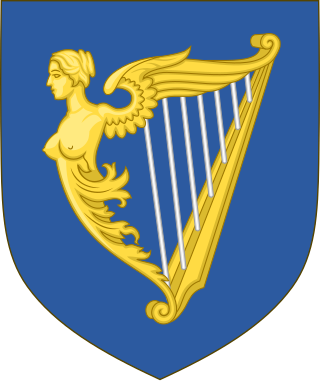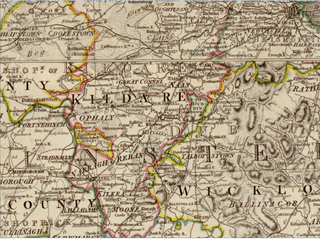Substantive holders
- 1605: Nicholas Kenny [4]
- 9 February 1644: Sir Maurice Eustace, later Lord Chancellor of Ireland
- Patrick Tallant (d. 1663?)
- 1663: Francis Leigh
- in 1739: Lewis Meares
- 1752: George Meares [3]
This is a list of appointments as Escheator of Leinster , a notional 'office of profit under the crown' which was used three times to resign from the Irish House of Commons.
The escheator was originally responsible for the administration of escheat /ɪsˈtʃiːt/ [1] [2] , a common law doctrine that transfers the real property of a person who has died without heirs to the crown or state.
The office was formerly substantive. It was founded in 1605, when the escheatorship for Ireland was divided among the provinces of Connaught, Leinster, Munster, and Ulster. [3] The first holder was Nicholas Kenny, who had been escheator-general of Ireland. [4]
After the Acts of Union 1800, the office was retained as a sinecure, with occasional legal duties. Walter Glascock was appointed about 1801, and his appointment was renewed by letters patent in 1830, 1837, and 1838. In the latter year, however, all of the Irish escheatorships were abolished by the Lord Lieutenant of Ireland. [7] [8]

Theobald Mathew was an Irish Catholic priest and teetotalist reformer, popularly known as Father Mathew. He was born at Thomastown, near Golden, County Tipperary, on 10 October 1790, to James Mathew and his wife Anne, daughter of George Whyte, of Cappaghwhyte. Of the family of the Earls Landaff, he was a kinsman of the clergyman Arnold Mathew.

The Irish House of Commons was the lower house of the Parliament of Ireland that existed from 1297 until 1800. The upper house was the House of Lords. The membership of the House of Commons was directly elected, but on a highly restrictive franchise, similar to the unreformed House of Commons in contemporary England and Great Britain. Catholics were disqualified from sitting in the Irish parliament from 1691, even though they comprised the vast majority of the Irish population.
Escheat is a common law doctrine that transfers the real property of a person who has died without heirs to the crown or state. It serves to ensure that property is not left in "limbo" without recognized ownership. It originally applied to a number of situations where a legal interest in land was destroyed by operation of law, so that the ownership of the land reverted to the immediately superior feudal lord.
Members of Parliament (MPs) sitting in the House of Commons in the United Kingdom are not permitted to resign their seats. To circumvent this prohibition, MPs who wish to step down are instead appointed to an "office of profit under the Crown", which disqualifies them from sitting in Parliament. For this purpose, a legal fiction is maintained where two unpaid offices are considered to be offices of profit: Steward and Bailiff of the Chiltern Hundreds, and Steward and Bailiff of the Manor of Northstead. Although the House of Commons Disqualification Act 1975 lists hundreds of offices that are disqualifying, it is rare for an MP to be nominated to a legitimate office of profit; no MP lost their seat by being appointed to an actual office between 1981, when Thomas Williams became a judge, and 2022, when Rosie Cooper became the chair of an NHS foundation trust.
Sligo Borough is a former borough constituency in Ireland, represented in the House of Commons of the Parliament of the United Kingdom.
The High Sheriff of Monaghan was the British monarch's representative in County Monaghan, a territory known as his bailiwick. Selected from three nominated people, he held his office for the duration of a year. He had judicial, ceremonial and administrative functions and executed High Court Writs.
The High Sheriff of Westmeath was the British Crown's judicial representative in County Westmeath, Ireland from its creation under The Counties of Meath and Westmeath Act 1543 until 1922, when the office was abolished in the new Free State and replaced by the office of Westmeath County Sheriff. The sheriff had judicial, electoral, ceremonial and administrative functions and executed High Court Writs. In 1908, an Order in Council made the Lord-Lieutenant the Sovereign's prime representative in a county and reduced the High Sheriff's precedence. However the sheriff retained his responsibilities for the preservation of law and order in the county. The usual procedure for appointing the sheriff from 1660 onwards was that three persons were nominated at the beginning of each year from the county and the Lord Lieutenant then appointed his choice as High Sheriff for the remainder of the year. Often the other nominees were appointed as under-sheriffs. Sometimes a sheriff did not fulfil his entire term through death or other event and another sheriff was then appointed for the remainder of the year. The dates given hereunder are the dates of appointment. The following is an incomplete list: all addresses are in County Westmeath unless stated otherwise.
In Ireland, the term city has somewhat differing meanings in Northern Ireland and the Republic of Ireland.
Charles Kendal Bushe, was an Irish lawyer and judge. Known as "silver-tongued Bushe" because of his eloquence, he was Solicitor-General for Ireland from 1805 to 1822 and Lord Chief Justice of the King's Bench for Ireland from 1822 to 1841.
The High Sheriff of Leitrim was the British Crown's judicial representative in County Leitrim, Ireland from c.1582 until 1922, when the office was abolished in the new Free State and replaced by the office of Leitrim County Sheriff. The sheriff had judicial, electoral, ceremonial and administrative functions and executed High Court Writs. In 1908, an Order in Council made the Lord-Lieutenant the Sovereign's prime representative in a county and reduced the High Sheriff's precedence. However the sheriff retained his responsibilities for the preservation of law and order in the county. The usual procedure for appointing the sheriff from 1660 onwards was that three persons were nominated at the beginning of each year from the county and the Lord Lieutenant then appointed his choice as High Sheriff for the remainder of the year. Often the other nominees were appointed as under-sheriffs. Sometimes a sheriff did not fulfil his entire term through death or other event and another sheriff was then appointed for the remainder of the year. The dates given hereunder are the dates of appointment. All addresses are in County Leitrim unless stated otherwise.

The High Sheriff of Kildare was the British Crown's judicial representative in County Kildare, Ireland from the 16th century until 1922, when the office was abolished in the new Free State and replaced by the office of Kildare County Sheriff. The High Sheriff had judicial, electoral, ceremonial and administrative functions and executed High Court Writs. In 1908, an Order in Council made the Lord Lieutenant the Sovereign's prime representative in a county and reduced the High Sheriff's precedence. However, the sheriff retained his responsibilities for the preservation of law and order in the county. The usual procedure for appointing the sheriff from 1660 onwards was that three persons were nominated at the beginning of each year from the county and the Lord Lieutenant then appointed his choice as High Sheriff for the remainder of the year. Often the other nominees were appointed as under-sheriffs. Sometimes a sheriff did not serve his full term due to death or another event, and another sheriff was then appointed for the remainder of the year. The dates given in this article are the dates of appointment.
The High Sheriff of County Waterford was the Sovereign's judicial representative in County Waterford. Initially, an office for a lifetime, assigned by the Sovereign, the High Sheriff became an annual appointment following the Provisions of Oxford in 1258. Besides his judicial importance, the sheriff had ceremonial and administrative functions and executed High Court Writs.
Owen Wynne was an Irish landowner and politician.
The Clerk of the Crown and Hanaper was a civil servant within the Irish Chancery in the Dublin Castle administration. His duties corresponded to the offices of Clerk of the Crown and Clerk of the Hanaper in the English Chancery. Latterly, the office's most important functions were to issue writs of election to the Westminster Parliament, both for the Commons and for Irish representative peers in the Lords.
Laheen is a townland in the civil parish of Killashandra, barony of Tullyhunco, County Cavan, Ireland.
Claragh is a townland in the civil parish of Kildallan, barony of Tullyhunco, County Cavan, Ireland.